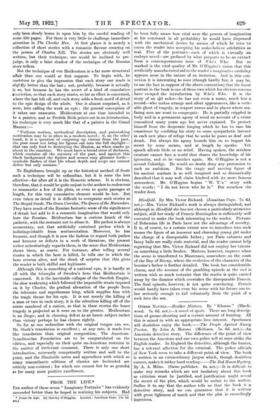FROM THE LIFE.*
run author of these seven " Imaginary Portraits " has evidently succeeded better than he hoped in realizing his subjects. Had * From the Life. By Harvey O'Higgins. London : Jonathan Cape. [7s. 6d. set.]
he been fully aware how vital were the powers of imagination at his command in all probability he would have dispensed with the mechanical device by means of which he tries to cozen the reader into accepting his make-believe celebrities as real. Five of the portraits—each of which is virtually an embryo novel—are prefaced by what purports to be an extract from a contemporaneous issue of Who's Who. But so marked is the vital quality of Mr. O'Higgins's vision that this artificially manufactured aid to the reader's imaginative credulity appears more in the nature of an intrusion. And in this con- nexion it is interesting to note (though hardly fair, it may be, to use the fact in support of the above contention) that the finest portrait in the book is one of those two which for obvious reasons have escaped the introduction by Who's Who. It is the story of an qld sailor—he has not even a name, much less a record—who makes strange and silent appearances, like a verit- able ghost of tragedy, in seaport towns and in places where sea- faring men are wont to congregate. He is partially crippled in body and in a permanent agony of mind on account of a crime committed many years ago but never expiated. To protect himself from the desperate longing which he has to ease his conscience by confiding his story to some sympathetic listener in each new place of refuge that he seeks he poses as deaf and dumb. But always his agony hounds him on to impart his secret by some means, and at length he speaks. Yet speech affords little or no relief. Having spoken, the stricken creature cannot face a world that shares the knowledge of his ignominy, and so he vanishes again. Mr. O'Higgins is not a second Coleridge. He would no doubt deny any pretension to such an ambition. But the tragic and moving figure of his ancient mariner is so well imagined and so dramatically described that it may well claim kindred with its more famous antecedent. Mr. O'Higgins begins " W. T.'s " story with the words : " I do not know who he is." But somehow the reader does.


































 Previous page
Previous page